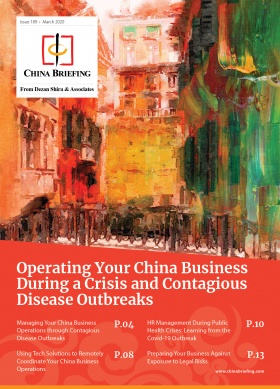New Cross-Border E-Commerce Zones, Extended Tax Incentives for Small Businesses in China
- China will establish 46 new cross-border e-commerce pilot zones but has not yet confirmed their locations.
- Interest on the deferred tax for bonded materials or finished products in the processing trade sold domestically will be waived off till end of 2020.
- The Canton Fair, which is the annual China Import and Export Fair, will be held online in June.
- China-Europe freight train capacity to be enhanced.
- Some preferential tax schemes for small business will be extended to 2023.
On April 7, 2020, Chinese Premier Li Keqiang chaired a weekly State Council Executive meeting, which rolled out informative measures to stabilize foreign trade and investment, in a bid to mitigate the impact of the COVID-19 pandemic.
The meeting decided to set up 46 new cross-border e-commerce pilot zones, offer tax breaks for trade processing enterprises, hold the Canton Fair online in June, promote the China-Europe freight trains, and extend preferential tax policies for small businesses.
China’s decisions to boost foreign trade and e-commerce
Setting up 46 new cross-border e-commerce zones
China will set up 46 new integrated pilot zones for cross-border e-commerce, on top of the 59 existing ones. So far, the total number of China’s cross-border e-commerce zones has reached 105, which are distributed in 30 provinces and cities.
Tax incentives will be offered to companies in these zones, such as exemptions on value-added tax (VAT) and consumption tax, as well as in the levy of corporate income tax (CIT).
The cities where integrated pilot zones with proper conditions are located will be listed into the pilot program of cross-border e-commerce retail import – the consumption activity of consumers in China purchasing goods from overseas through a cross-border e-commerce third party platform operator.
What’s more, in-zone companies will be encouraged to jointly build and share overseas warehouses – warehouses established in a foreign country for bulk storage of export goods and direct delivery to foreign consumers after the goods are sold via an online platform.
Supporting processing trade enterprises
To support processing trade enterprises hit by weak global demand and shrinking orders, the government also decided to waive the interest on the deferred tax for bonded materials or finished products in the processing trade sold domestically till the end of this year.
The pilot scheme where processing trade enterprises can choose to pay tariff for their domestic sales as either imported materials or finished goods will be expanded to all the comprehensive bonded zones (CBZs).
Moving the Canton Fair online
Given the serious global pandemic situation with COVID-19, the 127th China Import and Export Fair (Canton Fair) will be hosted online in mid to late June. The fair will invite domestic and foreign companies to prohibit their products online and provide around-the-clock services of online promotion, matchmaking, and negotiation.
Strengthening the capacity of China-Europe freight trains
The government aims to enhance the capacity of the China-Europe freight trains to undertake the transport of goods originally by sea and air – in a bid to stabilize the internationally disrupted supply chains. This is in line with the Circular about Using China-Europe Freight Trains to Mitigate Impact of Coronavirus issued by the Ministry of Commerce (MOFCOM) on April 3, which requests China-Europe freight trains to be enhanced and used to mainly help epidemic-hit companies to resume production and supplies and recover their import and export business operations.
Extending preferential tax policies for small businesses
The government will seek to improve inclusive financial services for small and micro-sized enterprises, household businesses, and agricultural households.
One big decision of the State Council meeting is to extend some preferential tax policies benefiting small businesses – which had expired at the end of 2019 – through to the end of 2023. The preferential tax policies include:
- Financial institutions will be exempted from paying VAT for interest income from loans of less than RMB 1 million (US$141,800) granted to the three categories of small businesses listed above;
- For financial institutions who extended loans of less than RMB 1 million (US$141,800) to agricultural households or those who provide agriculture households with insurance services, the CIT will be levied on 90 percent of the taxable income earned from the loan interest or the insurance premium; and
- Small loan companies who extended loans of less than RMB 1 million to agricultural households will be exempted from paying VAT on the interest income. The CIT will be levied on 90 percent of the taxable income earned from the loan interest. The Loan loss reserve provided at 1 percent of year-end loan balance can be deductible before tax.
Stabilizing international supply chain is a high priority
The April 7 executive meeting has been the third meeting of the State Council in the past half month to arrange work for stabilizing foreign trade.
Chinese Premier Li Keqiang said: “with the tight containment measures introduced across countries, (China’s) foreign trade and investment is persistently going downward”.
According to the World Trade Organization (WTO), global trade is expected to plunge by 13 to 32 percent in 2020. In the first two months of this year, China’s imports and exports fell by 9.6 percent in RMB, exports by 15.9 percent and imports by 2.4 percent, according to the General Administration of Customs of China (GACC).
On March 31, the executive meeting of State Council called for further adjusting fiscal and monetary policy, taking a variety of measures to boost domestic demand, and helping businesses, especially small, medium, and micro businesses, foreign trade companies, and self-employed businesses tide over difficulties.
On March 24, the State Council put forward measures to support enterprises in online negotiation, online sales, and online exhibition, and take the initiative to catch orders and promote cooperation.
We have consolidated the policies in our updated list tracking the government’s support for foreign trade companies and small and medium-sized enterprises (SMEs). Please check it out here.
Related Reading
 Investment Opportunities in China’s Healthcare Sector After COVID-19
Investment Opportunities in China’s Healthcare Sector After COVID-19
 How COVID-19 Will Transform the Fresh Food Industry in China
How COVID-19 Will Transform the Fresh Food Industry in China
 New Business Opportunities Emerging in China Under COVID-19 Outbreak
New Business Opportunities Emerging in China Under COVID-19 Outbreak
About Us
China Briefing is written and produced by Dezan Shira & Associates. The practice assists foreign investors into China and has done since 1992 through offices in Beijing, Tianjin, Dalian, Qingdao, Shanghai, Hangzhou, Ningbo, Suzhou, Guangzhou, Dongguan, Zhongshan, Shenzhen, and Hong Kong. Please contact the firm for assistance in China at china@dezshira.com.
We also maintain offices assisting foreign investors in Vietnam, Indonesia, Singapore, The Philippines, Malaysia, and Thailand in addition to our practices in India and Russia and our trade research facilities along the Belt & Road Initiative.
- Previous Article How COVID-19 Will Transform the Fresh Food Industry in China
- Next Article How to Enter China’s Online Gaming Market











